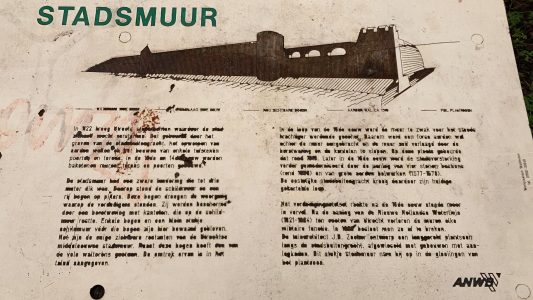Waterline 13th century – base layer 13th century – still visible arches – earthen rampart ca 1515 – level of the park
In 1122, Utrecht received city rights, which allowed the city to fortify itself. This was done by digging the city outer moat, building earthen ramparts, and constructing some tuff stone gates and towers. Brick walls, towers, and gates were built in the 13th and 14th centuries.
The city wall had a heavy foundation up to three meters thick. On top of that was the shield wall and a row of arches on pillars. These arches formed the walkway on which the defenders stood. They were protected by a battlement with crenellations, which rested on the shield wall. A few arches and a small section of the curtain wall in front of those arches have been preserved here. They are the only visible remnants of the medieval city wall of Utrecht. One of the many rampart towers also stood next to these arches. Its perimeter is indicated in the slope.
In the course of the 15th century, the wall became too weak for the increasingly powerful artillery. Therefore, a large earthen rampart was added behind the wall, and the wall itself was lowered by demolishing the battlement and the crenellations. This happened at this location around 1515. Later in the 16th century, the city fortification was expanded (around 1550) with large earthen bulwarks (1577-1578).
As a result, the eastern city outer moat got its current serrated course.
After the 15th century, the defensive structure deteriorated more and more. After the construction of the New Dutch Waterline (1821-1824) east of Utrecht, the walls lost their military function. In 1826, it was decided to demolish them. The garden architect J.D. Zocher designed a long park along the city outer moat, interspersed with buildings with landing stages. He incorporated this section of the city wall into the slopes of the park.
Legend: before 1540 lb, 1580 rb, 1829 lo, 1994 ro
City wall, city gate, tower, stone bastion, park, buildings and landing stages, railway, road, stand, 0-500-1000m
Regenerate response

